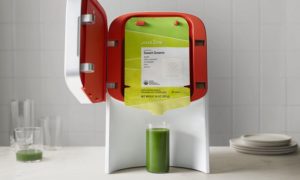
Juicero tickled social media’s insatiable schadenfreude for rich people getting swindled – but it shed light on a bigger problem.
Credit: Juicero
SAN FRANCISCO — If you’ve used the internet at any point in the past few weeks, you’ve probably heard of Juicero. Juicero is a San Francisco-based company that sells a $400 juicer. Here’s how it works: you plug in a pre-sold packet of diced fruits and vegetables, and the machine transforms it into juice. But it turns out you don’t actually need the machine to make the juice. On 19 April, Bloomberg News reported that you can squeeze the packets by hand and get the same result. It’s even faster.
The internet erupted in laughter. Juicero made the perfect punchline: a celebrated startup that had received a fawning profile from the New York Times and $120m in funding from blue-chip VCs such as Kleiner Perkins Caufield & Byers and Google Ventures was selling an expensive way to automate something you could do faster for […]











America is not dependent on immigrants for innovation.
Creativity is widely distributed in humanity, and even people born in America have a lot of it.
If you lived in San Francisco, as I do, you would know that a lot of this supposed innovation consists of a lot of idiotic startups that will never generate a profit, much less a dollar of revenue.
And if you went to Minneapolis, where I used to live, you would see companies like 3M and Honeywell that produce a constant stream of innovations without depending on immigrants because being creative is a normal part of their business.
All this stuff about immigrants is really propaganda sponsored by the tech companies that want to drive down wages by importing cheap labor.
While I can hazard a guess at where–per usual–you are getting your flawed talking points I’ll leave that to the side for now; suffice it to say, you need to educate yourself.
From the most recent comprehensive study I have seen, these are the actual facts, backed up by empirical data sets:
–More than three out of every four patents at the top 10 patent-producing U.S. universities, or 76 percent, had at least one foreign-born inventor.
–More than half of all patents (54 percent) were awarded to the group of foreign inventors most likely to face visa hurdles: students, postdoctoral fellows, or staff researchers.
–Foreign-born inventors played especially large roles in cutting-edge fields like semiconductor device manufacturing (87 percent), information technology (84 percent), pulse or digital communications (83 percent), pharmaceutical drugs or drug compounds (79 percent), and optics (77 percent).
–The almost 1,500 patents awarded to these universities boasted inventors from 88 different countries.
–Ninety-nine percent of the patents by foreign-born inventors were in science, technology, engineering and math (STEM), an area where the U.S. is projected to face a deficit of 230,000 workers by 2018.
We get it, shovland, you don’t like “them”, but your arguments against it is based on little more than thinly-veiled bigotry without actual substance. Come on over, join us in the 21st century, there’s lots of potential for those with the vision to see it.
Every graduate with an advanced degree working in a STEM-related field in the United States has been shown to create on average 2.62 additional jobs for native-born workers.”
You are correct, MJS. I have used the same social outcome data in my comments in SR and in my essays.
We should take lessons from Cuba which produces a great many doctors which are needed here and all over the world. Cuba has done very well with their free education system and we could benefit from the same approach here in the USA. That is one area where we have fallen drastically behind the rest of the modern world.